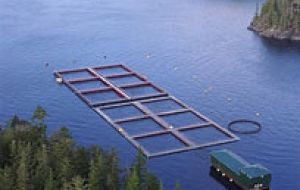MercoPress. South Atlantic News Agency
Global warming harms Chile's salmon industry
 Salmon Farming
Salmon Farming Two environmental experts lashed out the Chilean and Argentine governments this week for their failure to address environmental issues currently damaging ecosystems and agriculture on both sides of the Andes.
Dr. Antonio Lara from Chile's Austral University and his Argentine counterpart, Dr. Ricardo Villalba, warned that global warming is already producing drastic changes in their countries, pointing to the example of the Puelo River, which now carries 20% less water than it did 60 years ago. The river starts in Argentina and flows into Chile's Reloncaví Estuary. Lara's studies of tree rings located near the river showed that the drop in water levels is part of 84-year long cycle. "But this time it's much, much lower," warned the scientist. And the reduced flow of the river is starting to have adverse effects on one of Chile's most important industries. "This reduction in rainwater affects water rights to the river basin and salmon farming," said Lara. "Salmon farms in Region X depend on oxygen carried in the Puelo River's water, which oxygenates the Reloncaví Estuary." During hot summer months, oxygen dissolved in water drops to five parts per million (ppm) having dire consequences for the estuary's salmon stocks, thousands of which die from suffocation. The study also found that cutting down native forest causes water levels in nearby river basins to fall by around half, even if the area has been repopulated by new trees. Villalba, a climatologist, described the different effects in each country: the Argentine pampas now suffer regular flooding, while on the other side of the Andes Chile's central regions are experiencing their driest years in history. "What a shame it's not the other way round!" he joked. Chile's drought problem gets worse further north. Rainfall in Region IV's city of La Serena has fallen by about 50 percent over the last 120 years. Farmers will have to start looking at investing in Southern land if they want to ensure successful crops in the future. According to Lara and Villalba, neither the Chilean nor the Argentine government has paid enough attention to climate change - an increasingly tangible reality in both countries. The issue of water rights is currently passing through Chile's Supreme Court in the Los Pelambres case. Judges will have to decide whether the limited water in the Pupío Valley is more important for local farmers or a new tailings dam currently being constructed by Antofagasta Minerals. Lara and Villalba offer three recommendations for immediate action to combat the problems brought by such changes. First they stress the need for investigation into the effect of climate change at a local level, so that individual communities are better prepared. Second they recommend a reassessment of water rights so that the diminishing water can be used most efficiently. Finally, they emphasize the need for well-managed environmental policies towards conservation of rivers and forests. The Santiago Times




Top Comments
Disclaimer & comment rulesCommenting for this story is now closed.
If you have a Facebook account, become a fan and comment on our Facebook Page!